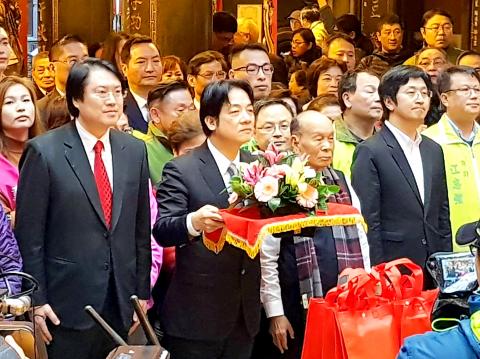The Executive Yuan has set a goal of creating a unicorn company in two years and increasing annual investment in start-ups by NT$5 billion (US$170.64 million) as part of a program to improve the domestic entrepreneurship environment and make Taiwan a regional hub for start-ups.
The Cabinet yesterday announced an action plan to improve the investment environment for Taiwanese start-ups and promise to help incubate the first unicorn business in two years and three other unicorn companies in the next six years.
A unicorn is a start-up that is less than 10 years old with a value of more than US$1 billion without going public.

Photo: Yu Chao-fu, Taipei Times
There are 228 unicorn companies in the world and Taiwan has yet to have its own, National Development Council Minister Chen Mei-ling (陳美伶) said.
“I can promise that there will be a unicorn [in Taiwan] in two years,” Chen told reporters, who asked whether the goal was overly ambitious.
There are three to four Taiwanese companies that have the potential to become a unicorn, she said, adding that the government would not name the companies, as it might affect their fundraising efforts.
While Taiwanese start-ups acquired NT$10 billion in investment last year, the government is set to increase that number by NT$5 billion every year in the next five years to help Taiwan overtake Singapore and become the center of innovation and investment in Asia.
The goals are attainable and were set following discussions with entrepreneurs, who approved the improvements made to the start-up industry by the government, Chen added.
The action plan would help start-ups in early-stage funding, recruit employees, facilitate mergers and public listings, and tap into international markets, the Cabinet said.
To boost fundraising efforts, up to NT$3 million in personal income tax breaks would be offered to angel investors who inject more than NT$1 million in a single start-up, it said.
Restrictions will be lifted to allow the National Development Fund to invest more than NT$1 billion in a single start-up or hold more than 30 percent of its shares, it said.
The Act for the Recruitment and Employment of Foreign Professionals (外國專業人才延攬及僱用法), which took effect on Feb. 8, provides tax benefits, healthcare measures and retirement benefits to attract skilled foreign workers and overseas students, the Cabinet said.
A new set of listing requirements for e-commerce companies that exclude profitability as a requirement is to be implemented next month to make it easier for start-ups to go public.
The Business Mergers and Acquisitions Act (企業併購法) might also be revised to smooth the merger of start-up companies, it said.
The government will also introduce tier-one international start-up accelerators to Taiwan to help local companies connect with global markets.
“Taiwan failed to grasp the business opportunities offered by the Internet and mobile applications, because of its focus on personal computer development at the time. It cannot afford to fall behind the latest trends in artificial intelligence, Internet of Things, financial technology and autonomous vehicles this time,” Premier William Lai (賴清德) said.

Alain Robert, known as the "French Spider-Man," praised Alex Honnold as exceptionally well-prepared after the US climber completed a free solo ascent of Taipei 101 yesterday. Robert said Honnold's ascent of the 508m-tall skyscraper in just more than one-and-a-half hours without using safety ropes or equipment was a remarkable achievement. "This is my life," he said in an interview conducted in French, adding that he liked the feeling of being "on the edge of danger." The 63-year-old Frenchman climbed Taipei 101 using ropes in December 2004, taking about four hours to reach the top. On a one-to-10 scale of difficulty, Robert said Taipei 101

Nipah virus infection is to be officially listed as a category 5 notifiable infectious disease in Taiwan in March, while clinical treatment guidelines are being formulated, the Centers for Disease Control (CDC) said yesterday. With Nipah infections being reported in other countries and considering its relatively high fatality rate, the centers on Jan. 16 announced that it would be listed as a notifiable infectious disease to bolster the nation’s systematic early warning system and increase public awareness, the CDC said. Bangladesh reported four fatal cases last year in separate districts, with three linked to raw date palm sap consumption, CDC Epidemic Intelligence

Two Taiwanese prosecutors were questioned by Chinese security personnel at their hotel during a trip to China’s Henan Province this month, the Mainland Affairs Council (MAC) said yesterday. The officers had personal information on the prosecutors, including “when they were assigned to their posts, their work locations and job titles,” MAC Deputy Minister and spokesman Liang Wen-chieh (梁文傑) said. On top of asking about their agencies and positions, the officers also questioned the prosecutors about the Cross-Strait Joint Crime-Fighting and Judicial Mutual Assistance Agreement, a pact that serves as the framework for Taiwan-China cooperation on combating crime and providing judicial assistance, Liang

US climber Alex Honnold left Taiwan this morning a day after completing a free-solo ascent of Taipei 101, a feat that drew cheers from onlookers and gained widespread international attention. Honnold yesterday scaled the 101-story skyscraper without a rope or safety harness. The climb — the highest urban free-solo ascent ever attempted — took just more than 90 minutes and was streamed live on Netflix. It was covered by major international news outlets including CNN, the New York Times, the Guardian and the Wall Street Journal. As Honnold prepared to leave Taiwan today, he attracted a crowd when he and his wife, Sanni,